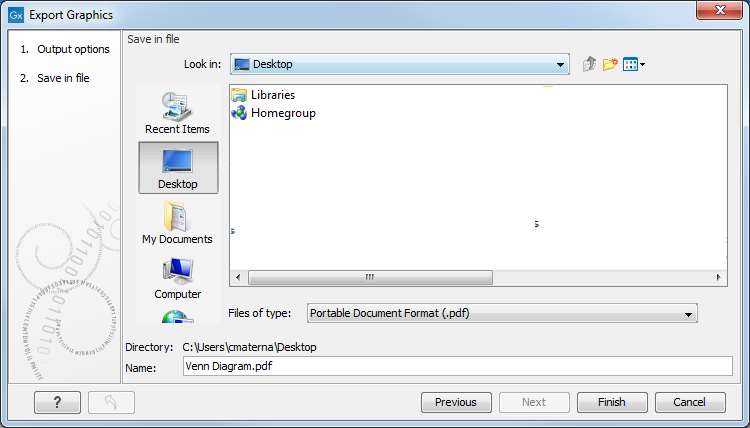Save location and file formats
In this step, you can choose name and save location for the graphics file (see figure 6.36).

Figure 6.36: Location and name for the graphics file.
CLC Genomics Workbench supports the following file formats for graphics export:
| Format | Suffix | Type |
|---|---|---|
| Portable Network Graphics | .png | bitmap |
| JPEG | .jpg | bitmap |
| Tagged Image File | .tif | bitmap |
| PostScript | .ps | vector graphics |
| Encapsulated PostScript | .eps | vector graphics |
| Portable Document Format | vector graphics | |
| Scalable Vector Graphics | .svg | vector graphics |
These formats can be divided into bitmap and vector graphics. The difference between these two categories is described below:
Bitmap images
In a bitmap image, each dot in the image has a specified color. This implies, that if you zoom in on the image there will not be enough dots, and if you zoom out there will be too many. In these cases the image viewer has to interpolate the colors to fit what is actually looked at. A bitmap image needs to have a high resolution if you want to zoom in. This format is a good choice for storing images without large shapes (e.g. dot plots). It is also appropriate if you don't have the need for resizing and editing the image after export.
Vector graphics
Vector graphic is a collection of shapes. Thus what is stored is information about where a line starts and ends, and the color of the line and its width. This enables a given viewer to decide how to draw the line, no matter what the zoom factor is, thereby always giving a correct image. This format is good for graphs and reports, but less usable for dot plots. If the image is to be resized or edited, vector graphics are by far the best format to store graphics. If you open a vector graphics file in an application such as Adobe Illustrator, you will be able to manipulate the image in great detail.
Graphics files can also be imported into the Navigation Area. However, no kinds of graphics files can be displayed in CLC Genomics Workbench. See External files for more about importing external files into CLC Genomics Workbench.
